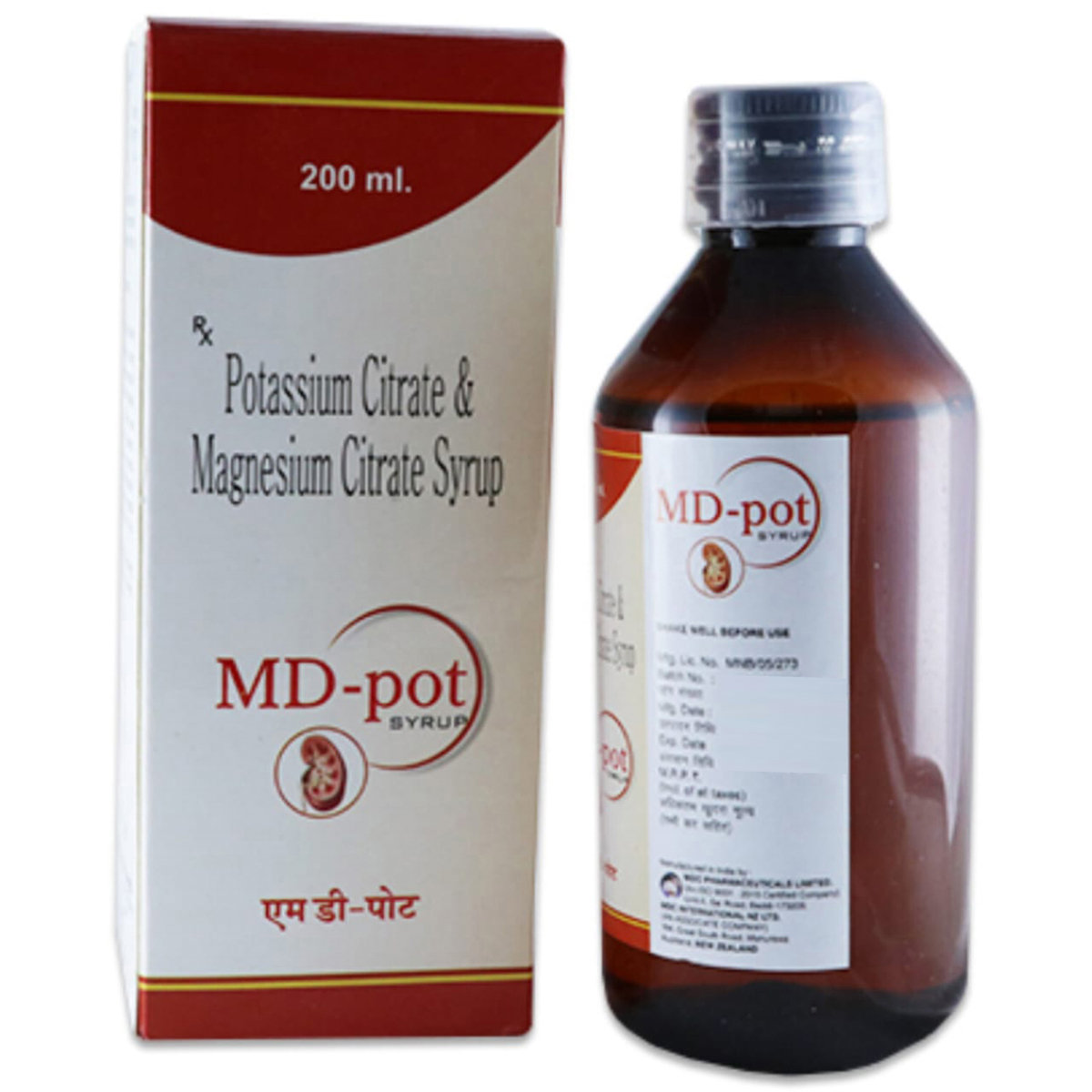Disolv Syrup 200 ml
MRP ₹145
(Inclusive of all Taxes)
₹21.8 Cashback (15%)
Know Your Delivery Time
Provide Delivery Location

Secure Payment

India's Most Trusted Pharmacy

Genuine Products
Composition :
Manufacturer/Marketer :
Consume Type :
Expires on or after :
Return Policy :
About Disolv Syrup
Disolv Syrup is indicated for the treatment of renal tubular acidosis and kidney stones due to low citric acid levels or high uric acid. Kidney stones are small, hard deposits made up of calcium, phosphate and other minerals/acid salts that stick together in concentrated urine. Renal tubular acidosis is a condition in which the kidneys fail to excrete acids into the urine, this causes the blood to remain too acidic.
Disolv Syrup is a combination of two drugs, namely: Magnesium citrate and Potassium citrate. Disolv Syrup raises the urinary pH, potassium, magnesium and citric acid levels; this prevents the crystallisation, growth and accumulation of stone-forming salts.
You are advised to take Disolv Syrup for as long as your doctor has prescribed it for you, depending on your medical condition. In some cases, you may experience certain common side effects such as abdominal discomfort, diarrhoea, nausea, and vomiting. Most of these side effects do not require medical attention and will resolve gradually over time. However, you are advised to talk to your doctor if you experience these side effects persistently.
Consult your doctor before taking Disolv Syrup if you are pregnant or breastfeeding. Disolv Syrup is not recommended for children as safety and effectiveness have not been established. It is not known if alcohol interacts with Disolv Syrup , so please consult a doctor. Keep your doctor informed about your health condition and medicines to rule out any side effects.
Uses of Disolv Syrup
Disolv Syrup is used in the treatment of kidney stones, renal tubular acidosis. The detailed uses of Disolv Syrup are as follows:
- Kidney Stone Prevention: Disolv Syrup is often used to help dissolve and prevent the formation of kidney stones by reducing the concentration of stone-forming substances in the urine.
- Kidney health: Disolv Syrup supports kidney health by maintaining proper mineral balance.
- Relief from Pain: Disolv Syrup may provide relief from pain associated with urinary stones by alleviating discomfort during urination and reducing spasms in the urinary tract.
- Renal Tubular Acidosis: Disolv Syrup contains Magnesium Citrate and Potassium Citrate, which help increase urinary pH, reducing acidity.

Have a query?
Directions for Use
- Disolv Syrup can be taken after meals or as advised by the doctor.
- Follow your doctor's instructions on the dosage and timing of this medication to ensure safety.
- Check the label for directions before use.
- Mix the advised dose of Disolv Syrup with a glass of water as directed and take it orally.
- Shake the bottle well before use.
Key Benefits
Disolv Syrup is a combination of two drugs, namely: Magnesium citrate and Potassium citrate. Disolv Syrup is indicated for the treatment of renal tubular acidosis with calcium stones, uric acid lithiasis with or without calcium stone, hypocitraturic calcium oxalate nephrolithiasis (kidney stones). Disolv Syrup raises the urinary pH, potassium, magnesium and citric acid levels; this prevents the crystallisation, growth and accumulation of stone-forming salts.
How Disolv Syrup Works
Storage
- Drink water or other clear fluids.
- To prevent worsening of pain, limit intake of tea, coffee, or alcohol.
- Include bland foods like rice, toast, crackers, and rice in your diet.
- Avoid lying down immediately after eating as it may cause indigestion or heartburn.
- Avoid acidic and spicy food as it may cause indigestion.
- Preventing Vomiting (Before it Happens)
- Take medication exactly as prescribed by your doctor. This can help minimize side effects, including vomiting.
- Having a small meal before taking your medication can help reduce nausea and vomiting.
- Talk to your doctor about taking anti-nausea medication along with your prescribed medication.
- Managing Vomiting (If it Happens)
- Try taking ginger in the form of tea, ale, or candy to help alleviate nausea and vomiting.
- What to Do if Vomiting Persists
- Consult your doctor if vomiting continues or worsens, consult the doctor for guidance on adjusting your medication or additional treatment.
- Inform Your Doctor: Notify your doctor immediately about your diarrhoea symptoms. This allows them to adjust your medication or provide guidance on managing side effects.
- Stay Hydrated: Drink plenty of fluids to replace lost water and electrolytes. Choose water, clear broth, and electrolyte-rich drinks. Avoid carbonated or caffeinated beverages to effectively rehydrate your body.
- Follow a Bland Diet: Eat easy-to-digest foods to help firm up your stool and settle your stomach. Try incorporating bananas, rice, applesauce, toast, plain crackers, and boiled vegetables into your diet.
- Avoid Trigger Foods: Steer clear of foods that can worsen diarrhoea, such as spicy, fatty, or greasy foods, high-fibre foods, and dairy products (especially if you're lactose intolerant).
- Practice Good Hygiene: Maintain good hygiene to prevent the spread of infection. To stay healthy, wash your hands frequently, clean and disinfect surfaces regularly, and avoid exchanging personal belongings with others.
- Take Anti-Diarrheal Medications: If your doctor advises, anti-diarrheal medications such as loperamide might help manage diarrhoea symptoms. Always follow your doctor's directions.
- Keep track of your diarrhoea symptoms. If they don't get better or worse or are accompanied by severe stomach pain, blood, or dehydration signs (like extreme thirst or dark urine), seek medical help.
- Limit fruit intake to two servings a day, choose a low-potassium options like apples and strawberries.
- Restrict starchy vegetables like potatoes and pumpkin to half a cup daily.
- Avoid or limit foods like tomato products, high-bran cereals, and salty or sugary snacks.
- Limit dairy products to 200g of yoghurt or 300ml of milk per day.
What if I have taken an overdose of Disolv Syrup
Drug Warnings
Do not take Disolv Syrup if you are allergic to any of its components; if you have hyperkalaemia (high levels of potassium), delayed gastric emptying, intestinal obstruction, peptic ulcers, urinary tract infection, or renal insufficiency. Inform your doctor if you have gastrointestinal lesions. If you experience severe vomiting, gastrointestinal bleeding or abdominal pain, stop taking Disolv Syrup and consult a doctor immediately. Disolv Syrup is not recommended for children as safety and effectiveness have not been established. Consult your doctor before taking Disolv Syrup if you are pregnant or breastfeeding.
Drug-Drug Interactions
Drug-Drug Interactions
Login/Sign Up
Taking Disolv Syrup 200 ml with clidinium bromide may increase the irritant effects of potassium on stomach and upper intestine. This interaction is applicable only in tablet or capsule form of Disolv Syrup 200 ml.
How to manage the interaction:
Co-administration of Disolv Syrup 200 ml(tablet or capsule form) with clidinium bromide is not recommended as it can lead to an interaction, it can be taken if prescribed by the doctor. However, if you experience stomach pain, bloating, sudden dizziness or lightheadedness, nausea, vomiting (especially with blood), decreased hunger, black, tarry stools, consult the doctor immediately. Do not discontinue any medications without a doctor's advice.
Co-administration of trihexyphenidyl with Disolv Syrup 200 ml may increase the risk of stomach ulcers, bleeding, and gastrointestinal injury.
How to manage the interaction:
Taking trihexyphenidyl with Disolv Syrup 200 ml is not recommended as it can possibly result in an interaction, it can be taken if prescribed by a doctor. However, if you experience abdominal pain, bloating, sudden dizziness or lightheadedness, nausea, vomiting (especially with blood), loss of appetite, or black stools contact a doctor immediately. Do not discontinue any medications without consulting a doctor.
Taking Clozapine and Disolv Syrup 200 ml (in tablet or capsule form) together can increase the risk of stomach ulcers, bleeding, and other gastrointestinal injury.
How to manage the interaction:
Co-administration of Disolv Syrup 200 ml with Clozapine is not recommended, as it may lead to an interaction, it can be taken if prescribed by the doctor. However, if you experience severe stomach pain, bloating, sudden lightheadedness or dizziness, nausea, vomiting (especially with blood), decreased hunger, or dark, tarry stools, consult the doctor immediately. Do not discontinue any medications without a doctor's advice.
Coadministration of Oxybutynin and Disolv Syrup 200 ml can increase the risk of developing stomach ulcers or bleeding.
How to manage the interaction:
Taking Oxybutynin with Disolv Syrup 200 ml is generally avoided as it may lead to an interaction, it can be taken if prescribed by the doctor. Consult the doctor immediately if you experience severe stomach pain, bloating, lightheadedness, dizziness, vomiting (especially with blood), decreased hunger, or dark stools. Do not discontinue any medications without a doctor's advice.
Taking Darifenacin and Disolv Syrup 200 ml (in tablet or capsule form) together can increase the risk of stomach ulcers.
How to manage the interaction:
Taking Darifenacin with Disolv Syrup 200 ml is not recommended, as it may lead to an interaction but can be taken if prescribed by the doctor. However, if you experience severe stomach pain, bloating, sudden lightheadedness or dizziness, nausea, vomiting (especially with blood), decreased hunger, or dark, tarry stools, consult the doctor immediately. Do not discontinue any medications without a doctor's advice.
Taking Dicyclomine and Disolv Syrup 200 ml together can increase the risk of stomach ulcers, bleeding, and gastrointestinal injury.
How to manage the interaction:
Taking Dicyclomine with Disolv Syrup 200 ml is not recommended, as it may lead to an interaction, it can be taken if prescribed by the doctor. However, if you experience severe stomach pain, bloating, sudden lightheadedness or dizziness, nausea, vomiting (especially with blood), decreased hunger, or dark, tarry stools, consult the doctor immediately. Do not discontinue any medications without a doctor's advice.
Taking Cyproheptadine and Disolv Syrup 200 ml (in tablet or capsule form) together can increase the risk of stomach ulcers.
How to manage the interaction:
Taking Cyproheptadine with Disolv Syrup 200 ml is not recommended, as it may lead to an interaction but can be taken if prescribed by the doctor. However, if you experience severe stomach pain, bloating, sudden lightheadedness or dizziness, nausea, vomiting (especially with blood), decreased hunger, or dark, tarry stools, consult the doctor immediately. Do not discontinue any medications without a doctor's advice.
Taking Disolv Syrup 200 ml and trospium together can increase the risk of stomach ulcers, bleeding, and gastrointestinal injury.
How to manage the interaction:
Taking Trospium with Disolv Syrup 200 ml is not recommended as it may lead to an interaction, it can be taken if prescribed by the doctor. However, if you experience severe stomach pain, bloating, sudden lightheadedness or dizziness, nausea, vomiting (especially with blood), decreased hunger, or dark, tarry stools, consult the doctor immediately. Do not discontinue any medications without a doctor's advice.
Taking Diphenhydramine and Disolv Syrup 200 ml together can increase the risk of stomach ulcers, bleeding, and gastrointestinal injury.
How to manage the interaction:
Taking Diphenhydramine with Disolv Syrup 200 ml is not recommended, as it may lead to an interaction, it can be taken if prescribed by the doctor. However, if you experience severe stomach pain, bloating, sudden lightheadedness or dizziness, nausea, vomiting (especially with blood), decreased hunger, or dark, tarry stools, consult the doctor immediately. Do not discontinue any medications without a doctor's advice.
Taking Mesoridazine and Disolv Syrup 200 ml (in tablet or capsule form) together can increase the risk of stomach ulcers, bleeding, and gastrointestinal injury.
How to manage the interaction:
Co-administration of Disolv Syrup 200 ml with Mesoridazine is not recommended, as it may lead to an interaction, it can be taken if prescribed by the doctor. However, if you experience severe stomach pain, bloating, sudden lightheadedness or dizziness, nausea, vomiting (especially with blood), decreased hunger, or dark, tarry stools, consult the doctor immediately. Do not discontinue any medications without a doctor's advice.
Drug-Food Interactions
Drug-Food Interactions
Login/Sign Up
Diet & Lifestyle Advise
Drink plenty of fluids as they help in flushing out excess minerals.
Limit salt intake. High amounts of salt can increase the risk of kidney stones.
Maintain a healthy weight by exercising regularly.
Avoid foods rich in oxalates such as spinach, nuts, okra, dates, avocado, hot chocolate, cocoa, baked potato, french fries, and cereals as they might increase the risk of oxalate stones.
Try maintaining optimum levels of calcium in the body as too little or high calcium can lead to kidney stones.
Habit Forming
Therapeutic Class
All Substitutes & Brand Comparisons
RX
Out of StockUtimack Syrup
₹149
(₹0.67/ 1ml)
3% COSTLIERRX
K-2 Syrup 200 ml
Simon Pharmchem
₹150
(₹0.68/ 1ml)
4% COSTLIERRX
Out of StockMD Pot Syrup 200 ml
Mdc Pharmaceuticals Pvt Ltd
₹169
(₹0.76/ 1ml)
16% COSTLIER
Alcohol
Safe if prescribed
It is not known if alcohol interacts with Disolv Syrup . Please consult a doctor.
Pregnancy
Consult your doctor
Disolv Syrup belongs to pregnancy category C. Please consult your doctor if you have any concerns regarding this; your doctor will prescribe only if the benefits outweigh the risks.
Breast Feeding
Consult your doctor
Consult your doctor before taking Disolv Syrup ; your doctor will decide whether Disolv Syrup can be taken by breastfeeding mothers or not.
Driving
Safe if prescribed
Disolv Syrup is unlikely to affect your ability to drive. However, you are advised to drive only if you are alert.
Liver
Consult your doctor
Limited information is available regarding the usage of Disolv Syrup in patients with hepatic impairment. Please consult your doctor.
Kidney
Consult your doctor
Disolv Syrup might cause soft tissue calcification and hyperkalaemia in patients with renal insufficiency. Please consult your doctor if you have kidney impairment or any concerns regarding this.
Children
Safe if prescribed
The safety and effectiveness of Disolv Syrup in children have not been established.
Heart
Disolv Syrup should be taken with caution in patients with heart problems. Please inform your doctor if you have any pre-existing heart problems before using Disolv Syrup .
Geriatrics
Consult your doctor
Disolv Syrup should be used with caution in elderly patients due to an increased risk of side effects. Seek medical advice before using Disolv Syrup .
FAQs
Disolv Syrup contains Magnesium citrate and Potassium citrate. Disolv Syrup raises the urinary pH, potassium, magnesium and citric acid levels; this prevents the crystallisation of stone-forming salts.
To treat your condition effectually, continue taking Disolv Syrup for as long as prescribed. Do not be reluctant to speak with your doctor if you feel any difficulty while taking Disolv Syrup .
Avoid taking Disolv Syrup if you have peptic ulcers as Disolv Syrup has ulcerogenic potential, which could lead to further ulceration.
Diarrhoea might be a side-effect of Disolv Syrup . Drink lots of fluids and eat non-spicy food if you experience diarrhoea. If you find blood in stools (tarry stools) or if you have severe diarrhoea consult your doctor. Do not take anti-diarrheal medicine on your own.
Consult a doctor before taking Disolv Syrup if you have an active urinary tract infection, as Disolv Syrup increases the urinary pH, which might promote further bacterial growth.
Country of origin
Manufacturer/Marketer address
Disclaimer
Author Details
We provide you with authentic, trustworthy and relevant information










